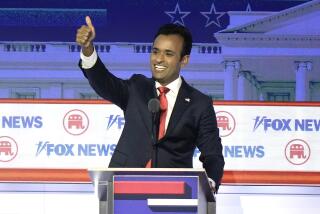Quayle Comes Out Swinging : In His New Book, the Ex-Vice President Dissects the Past and Tries to Clear the Way for a Shot at the White House
- Share via
CARMEL, Ind. — It’s tough, getting laid off a job you really, really like.
Just ask Dan Quayle.
Not so very long ago, he was surrounded by staff and showered with perks. Now, the former vice president has been reduced to walking through airport metal detectors, like anyone else, and cringing when his belt buckle sets the buzzer off.
He does his own grocery shopping, drives his own car, answers his own phone and leaves his own shirts out for the laundry pickup. Not one Secret Service agent is there to join him on his daily jog. When the dogs are noisy, it is Quayle, not some underling, who chastises, “Quiet, you guys!”
Shooing the dogs out into a yard that features a bird feeder shaped like the White House, Quayle agreed that it’s a huge change, moving from No. 2 in command of the Free World to stay-at-home dad and husband.
“And I do miss it,” he said, “running the country with George Bush.”
In an interview Tuesday in the sun room of a house that is large but hardly a palace, Quayle sounded more upfront than wistful. He has purposefully laid low these last 18 months since he and Bush were voted out of Washington, turning down interview requests and generally blending into the rich green landscape of this suburb north of Indianapolis.
In the time-honored tradition of American political resurrection, he has used this period to write a memoir--a book he began outlining days after the defeat of ’92.
“Standing Firm” (HarperCollins) offers Quayle’s version of what went wrong--and, occasionally, what went right--in the elections of 1988 and ’92. It casts a sharp and critical eye on Quayle’s own numerous bungles as vice president of the United States. And it so harshly evaluates certain key figures in official Washington--not to mention most of the capital press corps--that it might well have been titled “Lashing Back,” or at least “Settling the Score.”
The book is a clear effort to change Quayle’s media image as a lightweight junior senator from Indiana who became the most caricatured figure in recent political history. With its forward-looking conclusion--”I have much to do”--”Standing Firm” also seeks to position Quayle for a future shot at the presidency.
And if at times this political autobiography reads like a study in self-exoneration, Quayle insisted, “I’m not a vindictive person. I just wanted to tell exactly what happened.”
Spiral-bound copies of the manuscript of “Standing Firm” were sent to a handful of journalists, who in turn were required to promise not to reveal its contents before Thursday’s publication date. When the Washington Post “obtained several chapters independently” and jumped that embargo date, a minor flap ensued. Republicans scathed by Quayle’s literary sword were not amused. Neither was Newsweek, the Post’s sister publication, which had purchased exclusive first serial rights to “Standing Firm.”
“If you find out how they got those chapters, let me know,” said Quayle, who found his payment for the magazine rights slashed because of the leak.
On the other hand, what can you expect from a pack of “very hungry sharks,” as Quayle describes the denizens of America’s Fourth Estate. Right from the start, right from the moment his wife, Marilyn, pulled the hot rollers out of her hair and learned that her husband had been selected George Bush’s 1988 running mate, Quayle writes, he was the object of what he calls “unprecedented media abuse.”
The first 48 hours after his nomination brought nothing but “a flood of negative publicity,” Quayle said. Until then, Quayle had felt pretty sure of himself. He was popular in his home state, and he had even (briefly) considered throwing his own hat into the presidential ring in 1988.
Suddenly, Quayle writes, he was a rich kid, a lousy student and, if not an outright draft dodger, a guy who used connections to join the National Guard. He was a “pampered peabrain,” and a pretty boy--”a cross between Vanna White and the William Hurt character in ‘Broadcast News’ “--chosen mainly to appeal to female voters. Because “J. Danforth Quayle” sounded like the kind of name that ought to have a Roman numeral attached to it, one newspaper appended a “III” to Quayle’s name.
But Quayle was also inaccessible in the days following his nomination, a miscalculation he lays at the feet of Republican handlers who cocooned him in hopes of warding off further media damage.
“I let others do the thinking for me, and that was a mistake,” Quayle said. “It’s like anything else in life--if you don’t trust your instincts, you’re not going to get very far.”
The cartoon imprint stuck. “It was a comfortable caricature,” Quayle said.
Nothing Quayle could do seemed to improve this perception. Most of what he did, and nearly all of what he said, seemed to make it worse.
It was not as if there was no precedent for poking fun at the President’s chief sidekick. Lyndon Johnson used to say the vice presidency consisted of wearing funny hats and attending state funerals. Even Richard Nixon dropped by to warn Quayle that “vice presidents are to be kicked around.”
Quayle writes that he also ran smack into a generational issue. Many of the reporters assigned to cover him were, like Quayle, scions of the Baby Boom era. And Quayle was way too strait-laced for their comfort.
“You’re just not one of us,” one reporter came right out and told Quayle. He played golf, he lived in the suburbs, he had a wife and three kids with gobs of gorgeous teeth--and whether he had inhaled was never even a question.
“There’s a way that they could understand a conservative Ronald Reagan or a conservative George Bush,” Quayle said. “But to have a conservative of their own generation be the first on the national ticket was something that was almost intolerable.”
*
The antagonistic relationship between Quayle and the media was cemented once and for all in the now-famous Battle of Huntington (as Quayle titles one of his chapters)--the Aug. 19, 1988, hometown press conference where the friendly combat that Quayle’s handlers had hoped to engender turned into a furious fracas with press, public and politicians all trying to outshout each other.
It was a “searing experience,” Quayle remembered, and it “put a line in the sand.” An “us versus them” mentality developed, surprising no one more than Dan Quayle himself.
And, Quayle relates in his book, the architects of Bush’s presidential campaign were not about to take steps to improve matters.
“Lee Atwater said we were the best thing going,” Quayle said. “As long as the press wanted to chase me, they were off Bush’s case.”
His personal barbecuing has given him some sympathy for what Bill Clinton has gone through in recent months as a result of scrutiny over Whitewater, Quayle said.
And because there were times when he hoped his own children were not watching TV news or looking at the newspapers, “I think I know what Chelsea is going through, too,” Quayle said.
In “Standing Firm,” Quayle attempts to even the score between him and the press. Only a few journalists come out sounding like credits to their profession. But to reach that conclusion, Quayle said he brought his own notebook and sat down “for a couple of hours” with more than half a dozen of the reporters who had covered him.
“I think my assessment of the media is fair,” Quayle said. “It’s not done in a hostile, angry or vindictive way.”
Quayle relives many of his gaffes, such as the time he sent an aide out to buy an anatomically correct doll in Chile or the occasion when he referred to a group of Samoans as “happy campers.”
A chapter called “Baked, Mashed and Fried” begins with the episode in the 1992 campaign when Quayle misspelled potato . Going back still earlier, he said he felt envious when Clinton made a grand production out of selecting Al Gore as his running mate. In 1988, when Bush introduced him in New Orleans, Quayle recalled, “I looked like the guy on the game show who’d just won the Oldsmobile.”
*
Revisiting those less-than-salutary days was painful, Quayle conceded--and watching his wife’s anguished reaction as she read a first draft of “Standing Firm” nearly brought tears to his eyes. “But it was a real political story,” Quayle said, “the story of a remarkable political downfall.”
The quiet writer’s life has given Quayle time for reflection. Recently, he set up a small investment group in Indianapolis, where he keeps an office. But mostly, it is he who is at home while the kids are at school and his wife Marilyn--who once remarked that “women do not want to be liberated from their essential natures as women,” seemingly excoriating women who choose employment outside the home--goes off to work in a big Indianapolis law firm.
He is thinking about writing another book, probably focusing on eight or 10 families around the world who illustrate the complexities of contemporary family life. But most of all, he is thinking about whether to jump back into politics and try for a lease at that big house on Pennsylvania Avenue.
“I clearly have the experience,” he mused, sounding as if he has persuaded himself and is practicing his stump speech. “I’ve been there. I know what the job is. I know the importance of making good decisions and staying with your decisions.”
By design, Quayle said, he has postponed the inevitable conversation with his wife and children about running for the presidency.
“But I’m 47 years old, I’ve been a congressman, a senator, vice president and, God willing, I still have many years ahead.”
In the meantime, Quayle is relaxed as he discusses his defeats and victories. He is particularly gracious as he bids farewell.
After all, as he notes in “Standing Firm,” “How you exit is important--especially if you’re thinking of coming back.”
More to Read
Sign up for our Book Club newsletter
Get the latest news, events and more from the Los Angeles Times Book Club, and help us get L.A. reading and talking.
You may occasionally receive promotional content from the Los Angeles Times.










